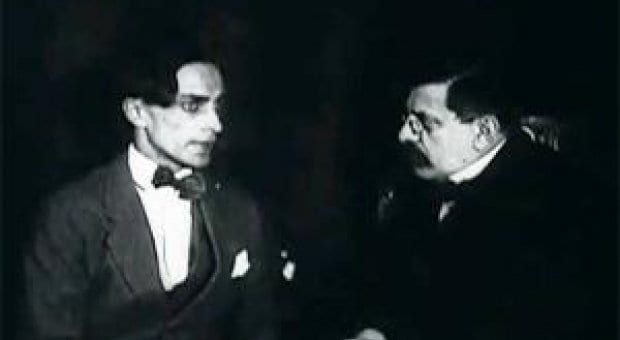Histories of marginalized peoples always enumerate firsts. One such first occurred on May 24, 1919, in a theatre on Kantstrasse in Berlin, Germany. The occasion was the premiere of Ander als die Andern (Different from the Others), which is very likely the first gay film.
The story of its creation begins earlier that year at a meeting of the Wissenschaftlich-Humanitäres Komitee (Scientific-Humanitarian Committee). The group was founded in 1897 by pioneering sexologist, and grandfather of the Western gay liberation movement, Magnus Hirschfeld. It worked to promote homosexual rights through scientific method and for the repeal of Paragraph 175, Germany’s anti-sodomy law.
“The aim of the Committee is research into homosexuality and allied variations, in their biological, medical, and ethnological significance as well as their legal, ethical, and humanitarian situation,” Hirschfeld explained.
Film director and theatre owner Richard Oswald approached the Committee to collaborate on the groundbreaking film project. Oswald proposed to direct; Hirschfeld would act as consultant and co-writer and appear on screen as himself.
The cast included Conrad Veidt, one of Germany’s most famous actors, who portrayed the somnambulist in The Cabinet of Dr Caligari and later appeared in Casablanca. Veidt played Paul Körner, a celebrated violinist and music teacher who falls in love with a male student. The two become lovers, come out to their conservative families and attempt to live openly. Körner is the victim of a blackmailer, leading to his arrest under Paragraph 175. Publicly humiliated, Körner commits suicide in a fit of despair. His partner also contemplates suicide, but Hirschfeld convinces him to avenge his lover by dedicating his life to the fight against 175. Check out the surviving fragment . . .
The film’s release caused seismic reactions all around. Hirschfeld and Oswald were celebrated by many progressives, even winning support among some members of the government, but the film scandalized religious communities and outraged Germany’s rising nationalist movement. A campaign was launched calling on the government to censor the film. Different from the Others was officially banned on Aug 18, 1920. Hirschfeld and his supporters appealed the ruling and managed to get an exemption for exhibition in educational settings, though it remained illegal to show it to the general public.
Throughout his fight to get the film seen, Hirschfeld was repeatedly libelled in the fascist press and heckled at public lectures and screenings. The intimidation reached a pinnacle when he was attacked by Nazi thugs after a speaking engagement in Munich. He was beaten savagely and awoke to find his obituary had been published in the local paper.
In Dresden, another newspaper illustrated the extreme homophobic mood of the times. Under the headline, “Weeds Never Die,” it reported that “Magnus Hirschfeld had been hurt enough to be put on the death list. We hear now that he is in fact recovering from his wounds. We have no hesitation in saying that we regret that this shameless and horrible poisoner of our people has not found his well-deserved end.”
Hirschfeld and his Institut für Sexualwissenschaft (Institute for Sexual Science) became one of the first targets of Nazi aggression after Hitler seized power in 1933. Not only was the institute’s extensive library burned, prints of Different from the Others were also fed to the flames. The film was thought entirely lost until 1976 when a 50-minute fragment turned up in Ukraine.
Despite the Nazis’ best efforts, Different from the Others endures as a unique document of our queer past; it remains a poignant artifact of hope and sanity in troubled times.

 Why you can trust Xtra
Why you can trust Xtra


